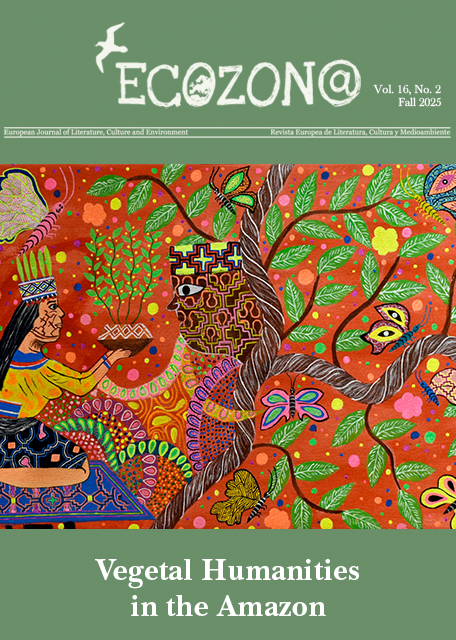<b>“Heaps of scrap metal and defunct machinery”: Assemblages, Ethics and Affect in W. G. Sebald’s Orford Ness</b> // "Montones de chatarra y maquinaria obsoleta”: Ensamblajes, ética y afecto en el Orford Ness de W. G. Sebald
DOI:
https://doi.org/10.37536/ECOZONA.2014.5.2.617Schlagworte:
Ecocriticism, material ecocriticism, posthumanism // Ecocrítica, ecocrítica material, posthumanismoAbstract
This essay explores aspects of the ‘material turn’ in contemporary thought and their incorporation into the emergent field of material ecocriticism. I tentatively suggest that although the ‘new materialisms’ have provided both posthumanism and ecocriticism with invaluable tools for decentring the ‘human’ and disrupting anthropocentric world views, they have at times deflected attention too far from the specificity of the human animal. I argue that while material ecocriticism has fruitfully engaged with concepts of material interrelatedness and its effects on bodies and environments, and begun to explore the ethical implications of such entanglements, it has, as yet, been less forthcoming on the subject of affect. Drawing on recent formulations of ‘affect theory’ that characterise affect as operating within the context of material immersion and processes of becoming, as well as being potentially instrumental in the recalibration of ethical positions, I contend that there are significant parallels with material ecocriticism that signal the potential for further exploration of what we might call material affect.
These arguments are explored further through a reading of W.G. Sebald’s account in The Rings of Saturn of a visit to the defunct military weapons-testing base at Orford Ness. I highlight Sebald’s evocation of the darkly disturbing, vitally affective power of the landscape’s assemblage of “scrap metal and defunct machinery” (237), which triggers a response in the narrator-figure that is integrally bound up with aspects of memory, conscience, and, ultimately, ethics. In the light of this reading, I argue for the need for an ongoing humanism within posthumanist ecocriticism that combines an understanding of our immersion in and dependence upon the nonhuman world with a continuing and specific investigation of the human animal and its affective sensorium, focused in particular on the way in which affect may play into the generation of ethical aspiration.
Resumen
Este ensayo explora aspectos del “giro materialista” en el pensamiento actual y su incorporación en el campo emergente de la ecocrítica materialista. Sugiero provisionalmente que aunque los “nuevos materialismos” han proporcionado tanto al posthumanismo como a la ecocrítica herramientas inestimables para descentrar “lo humano” y alterar las visiones antropocéntricas del mundo, a veces han desviado la atención demasiado lejos de la especificidad del animal humano. Sostengo que mientras que la ecocrítica materialista se ha dedicado fructíferamente a conceptos de interrelación material y sus efectos en los cuerpos y entornos, y ha empezado a explicar las implicaciones éticas de dichas relaciones, ha sido menos cooperativa, de momento, en el tema del afecto. Recurriendo a las formulaciones recientes de la “teoría del afecto” que caracterizan éste en la medida que funciona dentro del contexto de la inmersión materialista y de los procesos de llegar a ser, así como siendo potencialmente fundamental en la re-calibración de posiciones éticas, afirmo que existen paralelismos significativos con la ecocrítica materialista que señalan la posibilidad de una exploración más a fondo de lo que podríamos llamar afecto materialista.
Estos argumentos es exploran en detalle por medio de una lectura de la narración de W.G. Sebald en The Rings of Saturn sobre una visita a una obsoleta base militar de pruebas de armamento en Orford Ness. Destaco la evocación de Sebald del poder del paisaje oscuramente perturbador y vitalmente afectivo de la colección de “restos de chatarra y maquinaria obsoleta” (237), que desencadena una respuesta en la figura del narrador que está integralmente unida con aspectos de la memoria, la conciencia y, por último, la ética. En base a esta lectura, defiendo la necesidad de un humanismo en desarrollo dentro de la ecocrítica posthumanista que combina la comprensión de nuestra inmersión en y dependencia del mundo no humano con una investigación continua y específica del animal humano y su sensorium afectivo, centrándose en particular en la manera en que el afecto puede influir en la creación de aspiración ética.
Downloads
Downloads
Veröffentlicht
Ausgabe
Rubrik
Lizenz
Authors who publish with this journal agree to the following terms:
a) Authors retain copyright and grant the journal right of first publication with the work simultaneously licensed under a Creative Commons Attribution License that allows others to share the work with an acknowledgement of the work's authorship and initial publication in this journal (CC BY-NC for articles and CC BY-NC-ND for creative work, unless author requests otherwise.
b) Authors are able to enter into separate, additional contractual arrangements for the non-exclusive distribution of the journal's published version of the work (e.g., post it to an institutional repository or publish it in a book), with an acknowledgement of its initial publication in this journal.
c) Authors are permitted and encouraged to post their work online (e.g., in institutional repositories or on their website) prior to and during the submission process, as it can lead to productive exchanges, as well as earlier and greater citation of published work (See The Effect of Open Access).










